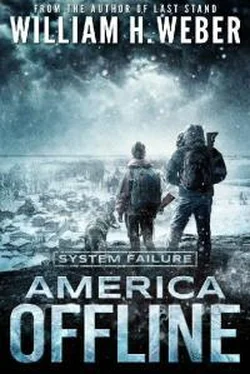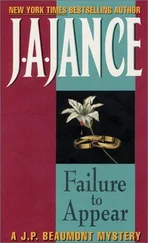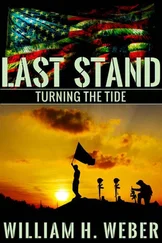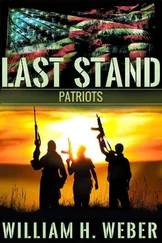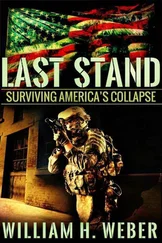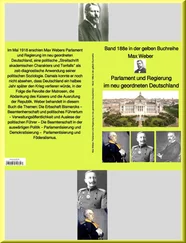“Mom, what’s a johnson?” Dillon asked.
Johnny howled with laughter. Up ahead, Manny put a hand over his mouth.
“Honey, that’s not nice.”
“But isn’t it someone’s last name?”
“Not the way they meant it.”
Dillon thought about this. “If it’s bad, then why is it up there on the wall?”
“Because some people think it’s okay now for them to do whatever they like. They love that the people enforcing the rules have gone away. That’s why we have guns,” she said, tapping the pistol on her hip. “To stop them from hurting us or anyone else.”
“Like that bad man Earl?” Dillon asked.
“That’s right,” she replied, her breath wavering as she lugged her suitcase up one riser at a time. “The world has always been filled with Earls, honey. It used to be that bad people hid in the shadows. But now they don’t need to hide. Not anymore.”
“So we’ll see him again?” Dillon asked innocently.
“Not him,” she replied. “But others just like him.”
They reached the twentieth floor and started down the darkened corridor. Trash and discarded possessions littered the hallway. Children’s toys, a Diaper Genie, heaps of clothing, the list went on and on. Most of the apartments greeted them with closed doors, but some stood ajar, offering an eerie view into lives that now sat abandoned, slowly rotting.
Holly arrived at the door to Amrita’s condo. A single sheet of white paper had been taped to the surface. The message on it was chilling.
Amrita, if you make it home, I’ve taken the children to the shelter at the Field Natural History Museum. Ravi
Holly tried the door and found it locked.
“They left,” a curt voice shouted from next door.
Holly spun to see a stout woman who probably couldn’t break five feet even with heels on. Her short brown hair was curly and surprisingly well kept.
“You a friend of the Patels?”
Yes, that’s right, Holly remembered . Amrita’s husband is Ravi Patel.
“Dear old friends,” Holly said.
“Tammy Schofield,” she offered, introducing herself. “My husband and I were among the first residents in the building. What a shame when you see what it’s become.”
Right now, Holly’s mind wasn’t on the sorry state of the Kensington Estates. “I just read the note on the door. Did Amrita ever make it home?”
Tammy shook her head. “Not that I know of. She was staying at her parents’ in the suburbs when it happened.”
“Her parents?” Holly said, not understanding.
“Trouble in the marriage, I suspect,” Tammy answered, putting a hand to the side of her mouth like they were sharing a secret. “Let me tell you, these walls aren’t nearly as thick as they look. Not for the price we paid anyway. If you ask me, she hit a real speed bump. Found motherhood too taxing. Life with Ravi wasn’t much of a treat either, I’m sure. So she took a few days off, least as far as I could tell.”
Manny looked about him. “Lady, are you sure it’s still safe to be here?”
“A lot safer in here than out there,” she assured him, propping up her chin as if to accentuate her courage. “Besides, me and my husband have enough to make do until this passes.”
It sounded like to her the power outage was a fever that was bound to break sooner than later. If Holly had a drop of water for every person at the airport who had voiced a similar opinion, she’d be up to her elbows.
“What about temporary shelters?” Johnny asked, motioning to the note Ravi had left on the door. “Is the Natural History Museum the only one around?”
“From what I heard, by day two, the mayor went shelter-crazy,” Tammy said, her short arms gesticulating wildly. “Every major public building’s been taken over. But good luck getting in any of them.”
“They’re already full?” Holly asked, suddenly concerned about where they would go next.
“Packed to the rafters, all of them. I heard the museum had an outbreak of the flu,” she said, pointing to the note on the door. “When the water cut out, the hubby and I decided to head over to the convention center. An absolute zoo. We turned right around in disgust. I heard the only shelter still accepting people is the one the Red Cross is running at the Grand subway station.”
“Thank you. Hey, why don’t you join us?” Holly suggested.
Tammy waved her hands like a person stuffed from dinner and refusing dessert. “After the trouble we had getting back, we aren’t going anywhere. This is our home. If I’m about to meet my maker, I’d rather do it in my own bed than lying on some ratty old cot.”
She did have a point, although Holly’s old bed was back in Seattle with Travis. Given the virtual mountains Holly had had to climb making it here from the airport―a journey of several miles―trying to make it halfway across the country was nothing short of suicide.
“So then it’s settled,” Johnny exclaimed with glee. “We’re going to the subway shelter. Let’s go then, people. Chop, chop.”
He seemed unusually upbeat at the idea of hitting a subterranean shelter. It could only mean one thing. The discarded remnants of people’s old lives scattered about them were giving him the willies. And perhaps they should.
They headed for the stairwell. Along the way, Holly couldn’t help thinking this was how Pompeii must have looked seconds before the streets were buried in ash.
The ghostly snarl of traffic along Interstate 90 only grew the closer Nate and Dakota got to Chicago. There was something eerie about weaving around vehicles trapped in the snow. In a few cases, they managed to catch a glimpse of what was inside. Sometimes the cars were empty. Sometimes they weren’t. The freezing cold had an unsettling way of locking a person in the moment of death, creating the false impression of slumber. They stopped a handful of times to lend a hand, only to discover those inside were long gone.
It was what Guy had done for them, by stopping to ensure they were all right. And Nate was sad to see their new friend go on his way.
But now, entering the outskirts of Chicago, Nate and Dakota were greeted by new sights and smells. The first was the smoke. Thick, black pillars of the stuff dotted the horizon. There was hardly a street in Chicago that didn’t seem to have a house or building on fire. For Nate, passing the burnt-out shell of a police station in Norwood Park was particularly haunting. If there was anything that summed up what Guy had told them earlier as they had shared a meal, it was the complete disintegration of law and order.
The second sight was in many ways just as heartbreaking. Dozens of refugees, many of them dragging sleds packed with children along with a few choice possessions, were trudging along the edges of the interstate. A few stopped to wave as they slowly passed. At least, that was what Nate thought they were doing. But soon, it became clear the waving hands had nothing to do with social grace.
It wasn’t a greeting. It was a warning.
Go no further. Probably the same kind of warning the residents of Louisiana might have given as they fled Katrina’s destructive wrath.
They were now only five miles from the city center.
“What will we do once we reach the shelters?” Dakota asked. There was a hint of fear in her voice, as there should be. This wasn’t a deserted city they were driving through. At one time, millions had called this home. Since the catastrophe, some of those people had fled, some had died, and some had stayed behind.
Nate was in the middle of that very thought when he spotted a man standing in the single freeway lane with a pistol in one outstretched hand. The other was gripped around the handle of a suitcase. He was screaming something at them, and it was loud enough for those moving along the outer shoulder to stop and observe.
Читать дальше
